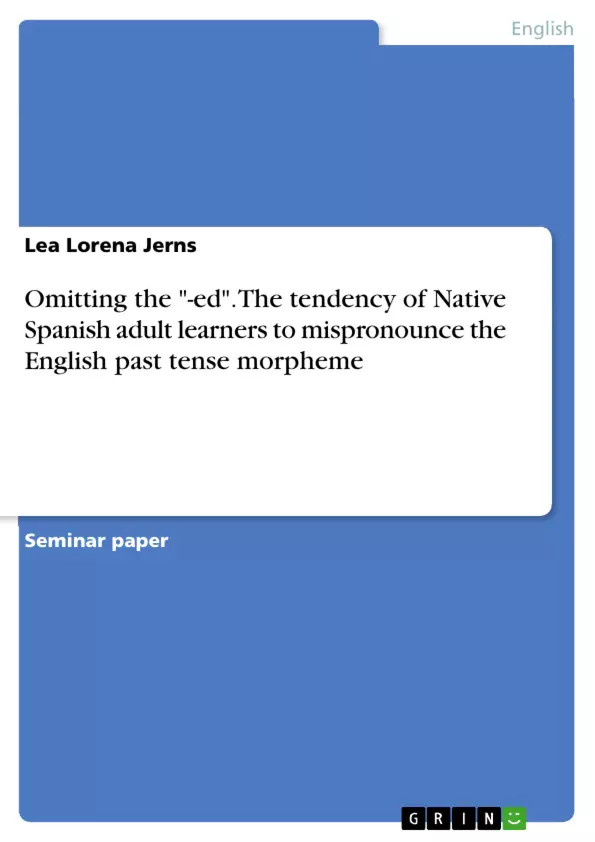Native Spanish speakers tend to mispronounce or to omit the -ed morpheme when it comes to regular English verbs in simple past. (example: managed, arranged, crowded). It is important to remind oneself of the fact that “[t]he basic morphological unit, however, is not the word, but the morpheme […], the smallest meaning-bearing unit of a language” (Kortmann, Bernd. English Linguistics: Essentials).
So, when the –ed morpheme is omitted the listener cannot discriminate whether the person speaking is talking in simple present or in simple past. This might lead to confusion and to serious misunderstandings. I personally found that native speakers of Spanish face serious problems when it comes to the pronunciation of English words.
In all the months I spent in Spain I somehow thought about those difficulties that occur constantly and when giving English lessons to Spanish teenagers I finally came to the conclusion that I have to investigate at least one aspect of the phenomenon of the mispronunciation of English words by native speakers of Spanish.
Table of Contents
- Introduction
- Introduction of the participants
- Analysis of the experiment
- Graphic illustration of the mistakes committed.
- Diagram 1 - Test results of Jorge
- Diagram 2 - Test results of Noel
- Diagram 3 - Test results of David
- Diagram 4 - Test results of Martín
- Conclusion
- Bibliography
Objectives and Key Themes
The objective of this study is to investigate the pronunciation difficulties faced by native Spanish speakers when using the English regular past tense morpheme -ed. The study aims to determine if native Spanish speakers tend to omit or mispronounce this morpheme, particularly focusing on the two non-syllabic allomorphs, /t/ and /d/.
- Pronunciation of the English regular past tense morpheme -ed by native Spanish speakers
- The influence of native language (Spanish) on the acquisition of English grammar
- The importance of accurate pronunciation for effective communication in English
- The role of phonological awareness in second language acquisition
- The potential challenges faced by L2 learners in perceiving and producing complex consonant clusters in English
Chapter Summaries
- Introduction: This chapter introduces the hypothesis of the study, which is that native Spanish speakers tend to omit or mispronounce the -ed morpheme in regular English verbs in the simple past tense. It also provides background information about the importance of the -ed morpheme for distinguishing between present and past tenses in English, highlighting the potential for confusion if the morpheme is omitted or mispronounced. The chapter further explores the challenges faced by L2 learners in perceiving and producing the -ed morpheme, drawing on existing research findings.
- Analysis of the experiment: This chapter presents the results of the experiment conducted with four native Spanish speakers. It includes a graphic illustration of the mistakes committed by each participant, showcasing the specific types of errors they made. The chapter provides detailed analysis of the data, offering insights into the participants' pronunciation patterns and the challenges they encountered.
Keywords
The primary keywords for this study include: native Spanish speakers, English regular past tense, -ed morpheme, pronunciation, mispronunciation, omission, second language acquisition, L2 learners, phonological awareness, consonant clusters, perception, production, linguistic interference.
Frequently Asked Questions
Why do native Spanish speakers struggle with the English "-ed" ending?
Linguistic interference from Spanish makes it difficult for learners to perceive and produce complex English consonant clusters, specifically the /t/ and /d/ allomorphs.
What happens when the "-ed" morpheme is omitted?
The listener may not be able to distinguish between simple present and simple past tense, leading to serious misunderstandings in communication.
Which specific sounds are most frequently mispronounced?
The study focuses on the two non-syllabic allomorphs of the past tense morpheme: /t/ (as in 'managed') and /d/ (as in 'arranged').
How was the experiment in this study conducted?
The researcher analyzed the speech of four native Spanish participants (Jorge, Noel, David, and Martín) and illustrated their mistakes using diagrams.
What is the "morpheme" in this linguistic context?
A morpheme is the smallest meaning-bearing unit of a language. In this case, "-ed" is the morphological unit that signals the past tense.
- Quote paper
- Lea Lorena Jerns (Author), 2015, Omitting the "-ed". The tendency of Native Spanish adult learners to mispronounce the English past tense morpheme, Munich, GRIN Verlag, https://www.grin.com/document/308721



